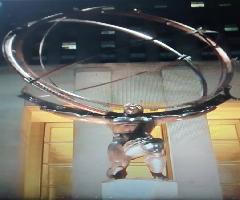At some music schools, students come in to learn the flute, piano or guitar and leave with what they've learned without giving much thought to the doors that have closed behind them. Eventually, they may decide the next level of professional instruction is needed but another entranceway doesn't strike them any different than their previous exit. "That's not who we are," says Joan Bergman, Executive Director of the Hoff-Barthelson Music School in Scarsdale, New York, as most of the traffic associated with their front door applies in time frames that could last a life time.
Believing in a comprehensive education,
The classical and jazz orientated school of 65 years matches its students to a private instructor through an interview process with the dean or executive director. Based not on musical talent but on a personality potential, says Public Relations Director Terri Joshi, "They decide who would be a good teacher for each student."
Out of that, students can take musicianship classes in subject areas such as music theory, composition, conducting and music technology. If a graduation certificate suits them, AP courses and an honors program may accompany them to the ceremony.
Encompassed in the piece of paper and all the private lessons, comes quite a lot performance opportunity. Whether taking part in the numerous community outreach ensembles and school recitals or enlisting themselves in the school's four-tiered orchestral program, music theory is not mistaken for actual practice.
They play that into a bond, which arises from an interest that isn't so common among most children. "There's a certain amount of self selection of kids who are interested in classical music. They find each other through this school so they spend a lot of time together and it's a real social network," says Ms. Joshi.
Academically, the certificate program requires that students can demonstrate the ability to perform
examples from the four significant periods of music literature and eventually present them in a graduation recital. "Then they get a diploma," says Ms. Joshi, and it often means acceptance to an Ivy League school or one of the renowned conservatories around the country.Of course, most of the students don't go onto high tiered music education or professional careers but Hoff-Barthelson obviously knows that music isn't simply the domain of the gifted. "We hope that they have gleaned from their years here a genuine love of music that they carry through the rest of their lives," says Ms. Bergman.
But they certainly don't wait for the rest of their lives to arrive in order to make use it. Outside of school, students get involved in piano duos and jazz bands or get themselves and their instruments into the pit in Community Theater and small playhouses.
Instrumental in the overall success of the school and its students is the exceptional and unusual dedication of parents. "They really reflect the spirit of the school," says Ms. Bergman of the fuzzy, warm, familial feel of the institution.
A prestigious faculty that is no stranger to the rest of the world can't help but have an impact either. "They fly around the world playing solo engagements," says Ms. Joshi but their annual public recital in March says just as much. "It's like a science lab. If your teacher can do the experiment, you've got a little more faith in them," says Ms. Joshi
Nonetheless, fashion and fad are always a factor when so many teenagers are centered in one location. So how does the school help blur the line between classical and cool. They don't have to because, "It's hip and Hoff-Barthelson," concludes the director.


